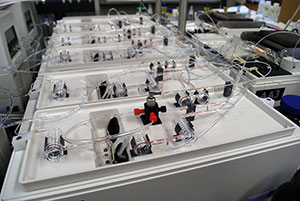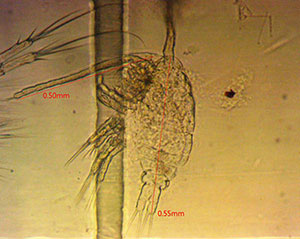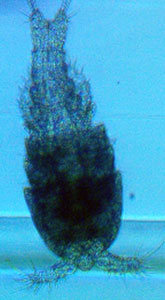Kodiak Island Limnology Laboratory
Water Sample Processing
Water Sample Processing
The Kodiak Island Limnology Laboratory (KILL) uses a state-of-the-art multiple channel segmented flow autoanalyzer to determine nutrient concentrations of water samples. All nutrient analyses adhere to EPA-approved methods. Standard calibration curves, blanks, and blind nutrient checks are prepared using Type A glassware and ultrapure 18 megohm deionized water to evaluate the quality of the analytical data generated from experiments run by the KILL. Analyses run with the autoanalyzer include
- Total phosphorous
- Total filterable phosphorous
- Filterable reactive phosphorous
- Ammonia
- Nitrate + nitrite
- Total Kjeldahl nitrogen
- Silicon




The photosynthetic pigments of chlorophyll a and phaeophytin a are analyzed using a separate spectrophotometer.
Zooplankton samples are keyed to the lowest possible taxonomic level. Biomass, density, and length are estimated by area and volume for each taxonomic group.
The KILL also determines color, pH, and alkalinity. Water samples are stored until processing on site in a dedicated walk-in freezer. All data generated by the KILL are housed in the ADF&G Westward Region limnology database.
Methods for lab operations can be found in the Westward Region limnology and Kodiak Island laboratory analysis operational plan.
- Ruhl, D. C. 2013. Westward Region limnology and Kodiak Island laboratory analysis operational plan (PDF 1,744 kB). Alaska Department of Fish and Game, Division of Commercial Fisheries. Regional Operational Plan CF.4K.2013.01, Kodiak.
